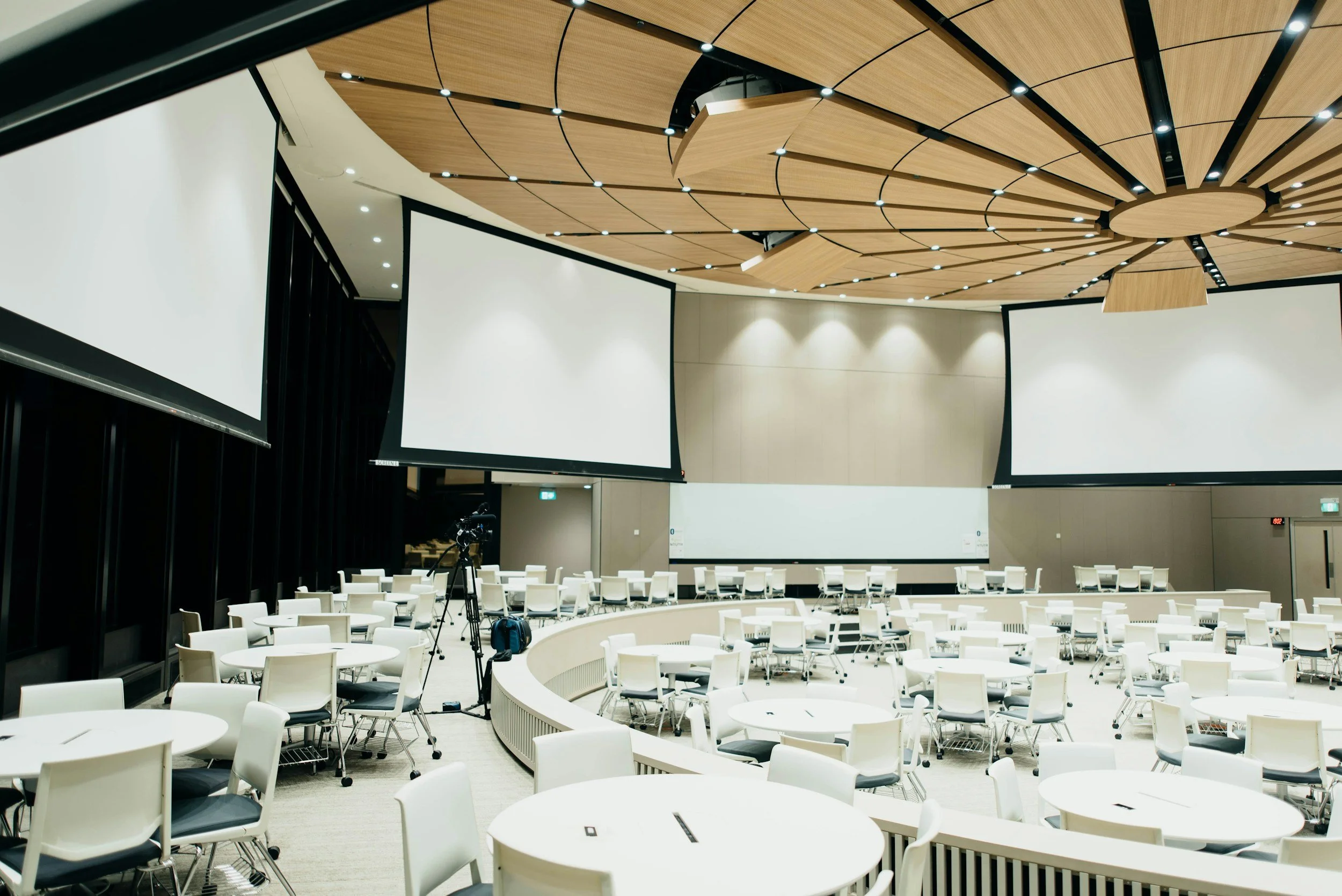How to Choose the Right Speaker for Your Event (A Complete Guide for Event Organisers)

Liam Sandford
Liam Sandford is a public speaking coach, marketing leader, and 2x Best Selling Author, including the book Effortless Public Speaking. He helps introverted professionals and leaders take control of public speaking anxiety and use speaking to market themselves, build influence, and communicate with impact.
Finding the right speaker for your event is one of the most high impact decisions you will make. The right speaker elevates the entire experience, strengthens your event’s reputation, and delivers real value to attendees. The wrong speaker weakens audience trust, disconnects from your theme, and makes your event feel less credible.
The goal is simple: choose a speaker who sits at the intersection of credibility, influence, relevance, and professionalism. This article breaks down exactly how to do that with a clear, practical process any event organiser can follow.
How to Match the Right Speaker to Your Audience Needs
Long before you look at speaker showreels or bios, your selection process must begin with your audience. A technically brilliant speaker who does not resonate with your attendees will never land. Audience alignment is the foundation of great event programming.
Key reasons audience alignment matters:
It shapes the topics and perspectives your speaker must bring.
It ensures the content feels relevant, not generic.
It protects your event’s credibility and brand positioning.
It influences whether attendees leave feeling inspired or indifferent.
It helps you avoid choosing someone who simply doesn’t fit.
How to Identify What Your Audience Wants From a Speaker
Every audience has underlying needs, frustrations, and desired outcomes. Event organisers sometimes overlook this by choosing speakers based purely on fame or perceived expertise. Instead, focus on what will genuinely move the room.
Look for alignment in:
Industry knowledge
Experience level
Aspirations and pain points
Tone (inspirational, tactical, motivational, data driven)
Cultural context
Themes already present in your event
A speaker who understands your audience’s mindset will always outperform a bigger name who does not. If you want to learn more about delivering specifically for an audience, check out the Ultimate Guide to Public Speaking in Marketing.
Why Audience Relevance Matters More Than Speaker Reputation
A well known speaker can still miss the mark if they talk at your audience instead of speaking to them. Relevance drives connection. Reputation only drives recognition. If your chosen speaker does not understand the room, the session will feel flat, regardless of credentials.
How to Review Speaking Samples to Evaluate a Speaker’s Ability
Speaking samples are one of the strongest predictors of how a speaker will perform at your event. They show you real delivery, not polished bios. Whether it is footage from previous talks, podcast interviews, or short form social media videos, what you see is what you will get.
What to look for in strong speaking samples:
Clear, purposeful storytelling
A message that puts the audience first
Strong pacing and vocal variation
Confidence without ego
Presence, connection, and energy
How to Analyse Storytelling and Message Clarity
Great speakers use stories as tools, not fillers. Their stories have structure. They reveal insight. They create emotional resonance. Most importantly, their storytelling isn’t self-indulgent or self-promotional, it is always in service of the audience.
Your ideal speaker should demonstrate:
Stories that illustrate useful concepts
Clear transitions between ideas
Examples that feel relatable to your attendees
A central message that is easy to follow
If their stories feel scattered, confusing, or self focused, they may struggle on stage.
How to Evaluate a Speaker’s Energy, Pacing, and Delivery Skills
Strong delivery is more than enthusiasm. It’s intentional pacing, smart pauses, tonal variation, and a calm, confident presence. Great speakers make complex ideas feel simple. They are not rushed. They don’t rely on a single tone. They hold the room with a mix of precision and personality.
Ask yourself:
Does their voice feel controlled and dynamic?
Do they rush or ramble?
Do they look comfortable and grounded?
Do they shift their pace at the right moments?
Do they make space for the audience to think?
These are signals of true speaking skill.
How to Use Testimonials and Social Proof When Choosing a Speaker
Testimonials can add reassurance, but they are not mandatory for identifying a great speaker. Many brilliant speakers, especially if they are early in delivering speaking engagement, may not have built a large testimonial library yet. Strong samples and strong communication are more reliable than a long list of endorsements.
Key points to consider:
Testimonials reveal how audiences actually responded.
They help you assess reliability, clarity, and engagement.
Social proof increases confidence but shouldn’t be the sole deciding factor.
Lack of testimonials does not mean lack of ability.
Emerging speakers may deliver freshness, originality, and high impact.
Why Testimonials and Social Proof Strengthen Speaker Selection
When you have access to them, testimonials give you insight into how real audiences experienced the speaker. Look for comments mentioning:
Impact or transformation
Clarity of message
Engagement
Ability to connect
Ease of working with the speaker
Testimonials referencing specific outcomes are far more valuable than generic phrases like ‘inspiring.’
How to Spot High Potential Speakers Without Testimonials
Some of the strongest speakers are early in their careers. They bring enthusiasm, modern relevance, and a genuine desire to deliver exceptional value. If their speaking samples are impressive and their communication is professional, they could provide a great low cost alternative for your event.
Be open to identifying talent based on capability rather than history.
How to Evaluate a Speaker’s Professionalism and Communication
This is one of the most overlooked factors in speaker selection. How a speaker communicates with you before the event is a strong predictor of how they will communicate with your audience on stage.
Signs of strong professional communication:
Timely and consistent responses
Polite, respectful tone
Thoughtful questions about your event and audience
Willingness to collaborate and customise
Organised, detail oriented behaviour
How Pre-Event Communication Predicts On Stage Experience
A speaker who is responsive, engaged, and respectful behind the scenes will bring the same qualities to the stage. The reverse is also true. Disorganisation, lateness, or an inflated ego during the planning phase almost always shows up during delivery.
Common Red Flags When Hiring an Event Speaker
Be cautious of:
Slow replies or inconsistent communication
A tone that feels self-important
Reluctance to tailor content
Lack of curiosity about your audience
Overpromising without clarity
These are signs the speaker will prioritise themselves over your attendees. You need the speaker to spend time and be present with your event audience. If they can’t do that with you to understand the event, who is attending, and what the ask is for them to deliver, they won’t put the audience first when delivering their presentation.
How to Balance Credibility and Influence When Choosing a Speaker
The best speakers blend influence with credibility. Influence without credibility is hollow. Credibility without influence is forgettable.
Why this balance matters:
Your audience gets both engagement and substance.
Speakers represent your organisation’s values.
Attendees want insights they can use, not just entertainment.
The right balance increases satisfaction and event loyalty.
It ensures attendees feel both energised and educated.
How the Best Speakers Combine Expertise and Engagement
This is where standout speakers live. They bring depth of knowledge, but make ideas accessible. They tell stories with purpose. They communicate with clarity, not complexity. They leave attendees feeling smarter, not overwhelmed.
TL;DR: How to Choose the Right Speaker for Your Event
Choosing the right event speaker requires aligning audience needs with credibility, influence, and professional communication.
Start with audience needs, not speaker popularity
Review speaking samples to assess storytelling and delivery
Use testimonials as supporting evidence, not mandatory criteria
Evaluate professionalism through pre-event communication
Choose speakers who balance influence with credibility
More From Liam Sandford
Read my book: Effortless Public Speaking. Learn how to speak confidently, reduce stress, and turn public speaking into your competitive advantage. These actionable public speaking tips will help you improve your presentation skills for any audience.
Join the free 5-day email course: Get daily lessons packed with practical strategies to deliver effective presentations and speak confidently. This course is designed to build your public speaking skills step by step. Sign up below:
